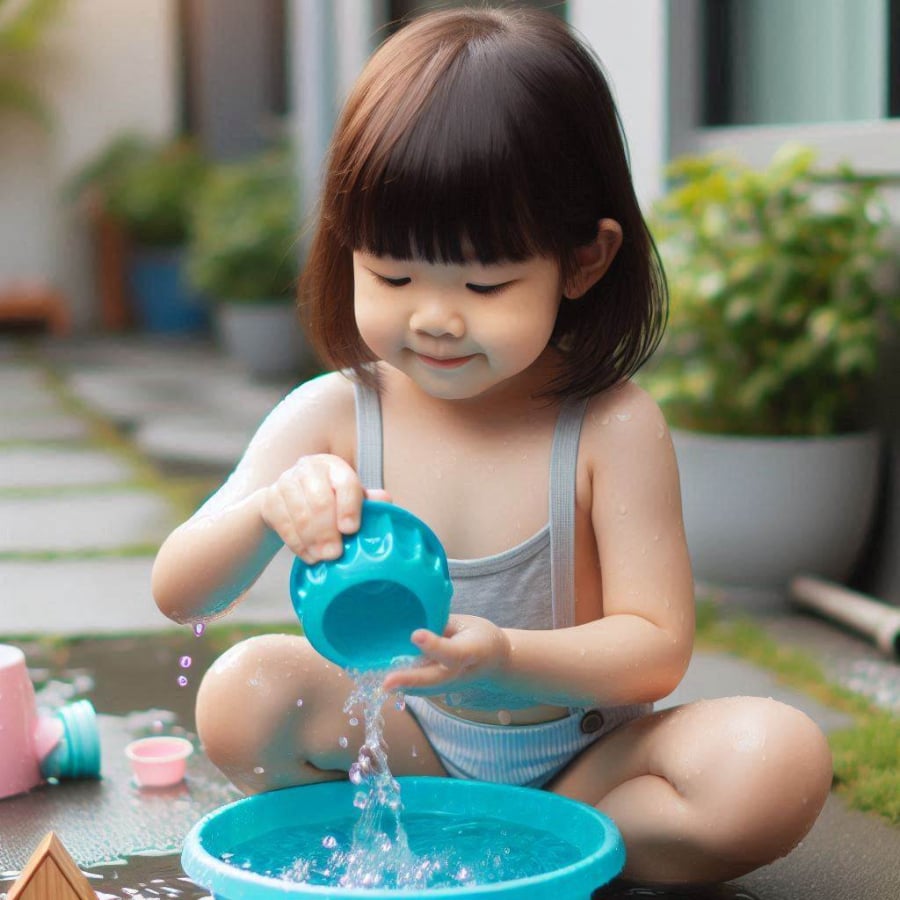Enhancing Communication Skills for Young Children
Interaction with peers and adults helps children develop their socio-emotional intelligence and social skills. It also contributes to building their empathy, self-esteem, and communication abilities.
Stimulating Mathematical Thinking Through Water Play
According to Dr. Laura Markham, author of “Peaceful Parent, Happy Kids,” children’s exploration and experimentation with water, such as pouring it into containers of different sizes, lay the foundation for learning mathematics. Through this activity, children learn to calculate and develop a sense of caution in various situations.

Children’s play with water, such as pouring it into differently-sized containers, lays the foundation for math learning.
Fostering Creativity and Curiosity Through Bubble Play
Blowing bubbles is not only fun but also stimulates intelligence, curiosity, and scientific thinking in children. This activity enhances their creative, artistic, and mathematical skills. Parents can guide their children in mixing water and soap solutions at home. As children observe the bubble-forming process, they will ask questions about why detergents create bubbles, what bubbles are, how they can float, and what causes them to burst.
Exploring the World Through Books
Daily reading is an effective way to stimulate young children’s imaginations. While reading, children visualize characters based on the words and often engage their senses of sight, hearing, smell, etc., to imagine an animal, a person, or a scent. All these activities subtly promote brain development.

Daily reading is an effective way to stimulate young children’s imaginations.
Self-Discovery Through Mirror Play
Mirror play is an essential activity for children to explore and discover themselves. They learn to identify facial and body features like eyes, nose, mouth, teeth, tongue, hands, and legs, which are novel concepts at this stage. This activity not only helps children understand themselves better but also enhances social connections and emotional development later on.
Parents can encourage their children to smile at themselves in the mirror. This habit fosters a cheerful and optimistic attitude and builds a solid psychological foundation for future growth.
The Benefits of Quality Sleep for Children
Quality sleep helps a child’s brain organize the day’s experiences, producing necessary neurotransmitters for memory, learning, and problem-solving. Sleep also aids in removing stress-related toxins, contributing to the child’s overall development.
Parents should ensure their children have a quiet and comfortable space to sleep. Loud noises can interrupt their sleep, affecting its quality. Adults should be cautious by closing doors gently, reducing sounds or turning off the TV, and providing a peaceful and safe environment for optimal rest.

Quality sleep helps a child’s brain to organize the day’s experiences.
Exploring the World Through Climbing Activities
According to India Express, children are often fascinated with climbing on objects. They won’t easily give up their exploration unless they encounter real danger. Parents can facilitate safe climbing on low tables, shoe racks, stones, shelves, or anything harmless.
Children have a natural instinct to explore their surroundings. Through climbing, they not only satisfy their curiosity but also develop essential physical skills like balance and coordination, contributing to their holistic development.
Creative Thinking Through Jigsaw Puzzles
Jigsaw puzzles are a fantastic way to stimulate children’s thinking. During play, they need to be dexterous and agile, which is beneficial for developing a sense of mathematics, physics, and engineering.
The Ancient Child-Rearing Method: “Mother Takes 3 Steps Back, Father Takes 2 Steps Forward”
Raising a child is an art form that requires an array of skills and strategies to succeed. The time and effort invested by parents are immeasurable, and their dedication is a testament to their love and commitment. It takes a village to raise a child, and with the right tools and knowledge, parents can master the art of parenting and shape their children’s future.






































